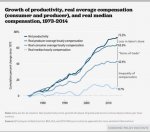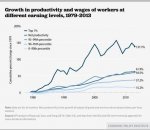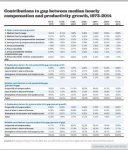- Joined
- Mar 21, 2012
- Messages
- 40,615
- Reaction score
- 9,087
- Gender
- Undisclosed
- Political Leaning
- Independent
Re: Understanding the Historic Divergence Between Productivity and a Typical Worker’s
I am not the subject of the debate.
It is not the "workers" productivity, it is the business's.
It is the workers labor which is payed for, and in the case of making the job easier, they are not laboring any more or even harder.
Already done. Labor has been compensated for. The worker isn't entitled to anything more than that.
Stop with the inanity.
Stop with the personal bs.According to excon,
I am not the subject of the debate.
Productivity is in relation to the product which does not belong to the employee.the employers are the ones who've caused all of the productivity gains, because, somehow, the employers who have been reaping the benefits of workers productivity have invented all of the technology with their own bare hands.
It is not the "workers" productivity, it is the business's.
It is the workers labor which is payed for, and in the case of making the job easier, they are not laboring any more or even harder.
iLOLHmm.. I want to see how you justify what has been happening.
Already done. Labor has been compensated for. The worker isn't entitled to anything more than that.
D'oh!Keep worshiping trickle down voodoo.
Stop with the inanity.



